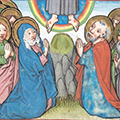Carmelite Homily for the First Sunday of Lent, February 18, 2024 – Lectionary 23 (Mark 1:12-15).
In today’s Gospel the very first words out of Jesus’ mouth in Mark’s Gospel is “Repent, and believe the Good News!” We hear that word “repent” and we think it is kind of a negative word. That it means to be sorry for our actions. But no, that’s not what it meant in those days. It meant repent = rethink. Like we use the word “pensively” to mean “thoughtfully.” ‘Pent’ means ‘to think.’ So what Jesus is announcing is “rethink” – think differently; think new. And it’s Good News. Everything we thought about life: oh, we’ve got to just survive it, or I’ve got to take care of just me, or life is hard, or God is mad. All that, no, rethink. It’s Good News. Life is meant to be Good News. Saint Therese says, “You will not arrive at what you desire by your own path or even by high contemplation, but only a great humility and surrender of heart.” I think that’s what Jesus means when he says, “Repent and believe in the Good News!” And that’s what Jesus is inviting us to. He is inviting us to put on the mind of Christ. The mind of Life. In Paul’s letter to the Philippians he begins with this beautiful passage about, “don’t worry about just yourself but worry about your neighbor too; take care of them.” And he concludes that passage with “put on the mind of Christ.” That’s what “repent” means: to put on the mind of Christ. And when we do that we see, “wow, I was thinking wrong; or I was doing wrong; or I was just simply wrong!” And then the new meaning of repent – sorry – can kick in. Because, wow, was I dumb! It’s time for me to rethink and relive. And that’s the Good News.


